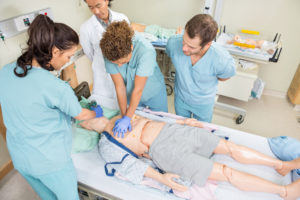As a nurse, you’ve chosen a career devoted to the welfare of others, to saving lives, and to making a difference. It’s a noble pursuit, but it also comes with a significant amount of responsibility. One crucial component of this responsibility is Basic Life Support (BLS) certification. In this guide, we’ll explore why BLS is so essential for nurses, the benefits it brings to your job, and how you can get certified with United Medical Education.
Why Nurses Need BLS Certification
BLS certification is more than just a line on your resume; it’s a life-saving skill set.
-
Patient Safety: BLS certification ensures you have the knowledge and skills to respond appropriately in life-threatening situations, a fundamental aspect of patient safety.
-
Requirement: Most healthcare institutions require nurses to have BLS certification. Having it keeps you compliant with your employer’s policies and industry standards.
-
Emergencies: In emergency situations, BLS techniques can stabilize patients until further medical help arrives.
Who Needs BLS Training?

-
All Nurses: Whether you’re a Registered Nurse (RN), Licensed Practical Nurse (LPN), or Nurse Practitioner (NP), BLS training is crucial.
-
Student Nurses: As a nursing student, acquiring BLS certification is a proactive step that will equip you with essential skills and make you more attractive to potential employers.
-
Specialty Nurses: If you work in critical care, emergency nursing, pediatrics, or any other specialty, BLS training can be particularly vital.
How Can BLS Training Help Nurses In Their Job?
BLS training enhances your capabilities as a nurse, extending beyond just the clinical benefits.
-
Confidence: BLS training instills confidence. You’ll know you can respond effectively in critical situations, alleviating stress and boosting your performance.
-
Competence: BLS certification demonstrates your commitment to your career, showcasing your competence to colleagues, employers, and patients.
-
Career Advancement: In many cases, BLS certification can enhance your career prospects. It may open doors to higher-level positions or specialized areas of nursing.
United Medical Education: Your Partner in BLS Certification
At United Medical Education, we understand the importance of BLS certification for nurses. That’s why we offer accessible and comprehensive BLS training and certification.
Here’s how you can get started:
-
Create a Free Student Account: Start by building a free student account on our website. This account gives you access to our BLS training materials and practice exams.
-
Study at Your Own Pace: All our courses are self-paced, allowing you to study when it suits you. This flexibility ensures you can balance your studies with your demanding career.
-
Take the Exam: Once you’re ready, you can purchase access to the final exam. Upon passing, you’ll receive a provider card and certificate, signifying your successful completion of the BLS course.
BLS and Nursing Career Advancement
BLS certification doesn’t just serve a functional purpose in the life-saving process; it can also be a significant boon for your career advancement. Possessing a BLS certification can set you apart from your peers, demonstrating to potential employers your dedication to patient safety and your ability to handle critical situations.
This is particularly true if you aspire to work in fields such as emergency nursing, pediatric nursing, or any other area where rapid, effective response to life-threatening situations is a regular part of the job.
Furthermore, having a BLS certification showcases your continuous learning mindset and readiness to upskill, attributes highly valued in the healthcare sector. Thus, BLS certification can contribute substantially to your professional growth and progression in the nursing field.
Differences Between BLS and CPR Certification
Though BLS and CPR are often used interchangeably, they are not identical. CPR, or Cardiopulmonary Resuscitation, is a fundamental component of BLS, focusing on maintaining the circulation of oxygenated blood when a person’s heartbeat or breathing has stopped.
On the other hand, BLS, or Basic Life Support, is a more comprehensive certification. While it includes CPR techniques, it also covers additional elements such as the use of automated external defibrillators (AEDs), relieving choking, and other emergency procedures.
BLS training also takes a team approach to life-saving care, emphasizing the coordination and communication needed for effective emergency response. So while all BLS-certified individuals are trained in CPR, not all CPR-certified individuals have the full range of knowledge and skills encompassed by BLS.
As a nurse, it’s beneficial to have both a CPR and BLS certification, as the comprehensive knowledge and skills you gain will ensure you’re prepared to respond effectively in a broader range of emergency situations.
Personal Stories
My friend Jessica, who works in pediatric nursing, would often talk to me about her hectic schedule. She’s actually part of the reason I created these courses. She told me a story about how she had to prepare for her BLS certification exam during work hours but wasn’t sure what to study. At United Medical Education we’ve solved this issue by outlining all the necessary training materials online prior to the final exam.



